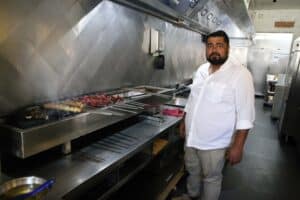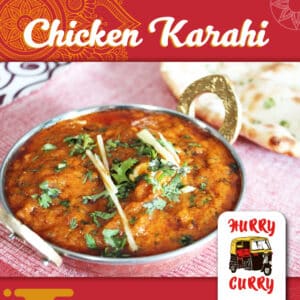In a man fighting stereotypes, and over a plate of Pakistani kebabs, THEO PANAYIDES finds a hard worker happy to have made Cyprus his home
The first time I visit Hurry Curry, it’s early on a Wednesday afternoon – a quiet slot, with only two tables occupied. Both sets of diners are mixed-race couples, though one (a silver-haired Cypriot man and a young, Sri Lankan-looking woman) may not be a couple per se; the old man seems avuncular – he may just be the woman’s employer – though he does rest his hand on her shoulder for a few moments. The walls of the Indian (actually Pakistani) restaurant pick up the theme of cultural mingling and mixing: one wall is covered with photos of landmarks from the likes of Lahore and Islamabad – but another is adorned with a sign reading ‘Friends’, in the logo of the famed TV sitcom (the fine print explains the allusion, adding ‘…of Hurry Curry’). Elsewhere, the room is dotted with Indian spices and bric-a-brac, the ceiling embellished with floral patterns.
The next day, I return to the relatively new Nicosia restaurant (it opened in 2021) to meet Muhammad Saqib Islam, who runs the place with his brother Atiq. (What’s his actual job description? “You can call me kind of a general manager”.) The theme of cultural mixing also returns with a vengeance – and indeed our conversation turns out to be a case of demolishing stereotypes, from both sides of the political spectrum. One side insists that Cyprus is profoundly racist, painting migrants as victims. The other assumes that foreigners from the Indian subcontinent – whether Indians, Sri Lankans, Bangladeshis, or Pakistanis like the brothers – are essentially here as opportunists, looking to work hard and make money without necessarily looking to be part of society. Saqib upends both theories.

His father, who died in 2000, ran a transportation business; his mum ran a sewing business and seems to have been the rock of the family, working “even sometimes 16 hours” to get her kids through school and university. (She now lives in Cyprus with her two sons, yet another way in which the family defies stereotype.) The brothers grew up in Gujranwala in north-eastern Pakistan – a happy childhood: “A lot of memories, a lot of cricket” – then moved to nearby Lahore, a city of over 11 million people, in 2003. Atiq was the first to come to Cyprus, in 2005; Saqib followed five years later, on a student visa, having already worked in catering and event management for a number of years. He studied Hotel Management at Kes College, then American College, then did an MBA in Finance – though his thesis sounds closer to sociology, its point being that we’re conditioned from childhood to believe certain truisms (or indeed stereotypes). “This was the theory behind it – that there are many things which we are being taught, by religion and by society… Of course I brought numbers to it also.”
He’s a big, confident, sociable-looking man, with slicked-back hair and neatly trimmed beard. He’s good with his hands, as well as writing theses: the brothers also run a construction company (that was actually Atiq’s main pursuit; the restaurant came later), and when it comes to construction work he’ll try his hand at anything – plumbing, painting, tiling. “I never feel it’s hard, or difficult, because I have one belief,” he tells me: “Whatever I see in my life is being done, or made, by a human being – and I am human also. The day when I see something which is not made by a human, I will not try to do it!”.

Saqib hesitates, not wishing to sound disloyal. “To be honest, I don’t think it’s a good place,” he replies at last. “It’s only a good place if you have something in your pocket, then you can continue. In Cyprus I can probably say that you come with zero, and you have a very good life in a few years – if you are a really hard worker. If you really work nicely. If you are good and consistent and you really stick to your work, and respect your work – I mean, you get respect here. There are a lot of opportunities.”
Now it’s my turn to hesitate – but we can’t exactly skirt around the elephant in the room. Do you get respect, as a quote-unquote third-country national? What about the racism?
“I will not just say ‘yes’ or ‘no’,” replies Saqib with the air of one who’s studied the subject thoroughly. “I can elaborate, I can explain. I can debate on it with anyone. I don’t see Cyprus as a country which is racist… I’m here almost 14 years, I don’t see any racism.”
Even when he first arrived? While he was looking for work?
“Well, it was my fault,” he admits. This is what foreign students do, they set out from college, having just arrived en masse for their first semester, “and the first shops they find, they will start asking ‘Do you have work?’. So you – as a person who is working in your shop, and is busy, and has a lot of things to do, and if you have more than 40 visitors coming every day to ask you this – what will you feel? Of course you will tell them ‘Please don’t disturb us’. So this, for these guys, becomes racism”. Sure, he concedes, you’ll find people who are rude or aggressive – but you’ll find such people everywhere. “If somebody talks with you bad, it doesn’t mean he’s racist. In your country,” he asks the proverbial foreigner, “does nobody talk with you bad sometimes? They do! So I met nine Cypriots today let’s say, for example, and one of them didn’t talk with me nicely – so I go home and write [on social media] ‘It is racism’. No, this is not, man! Same thing can happen in your city – maybe there you’ll find five out of nine. But it’s okay for you, because it’s your home.”
That, I suspect, is the crux of the matter: ‘Because it’s your home’. Clearly, Saqib’s idyllic opinion of Cyprus should be taken with a grain of salt: after all, he’s not likely to attract customers to his restaurant – around 60 per cent are Cypriots, only 10-15 per cent Indian or Pakistani, at least on weekdays; the proportions get reversed on weekends – by badmouthing their country. I nearly fall out of my chair when I ask what he likes here and he mentions punctuality (I suppose it’s possible that people in Pakistan are even less punctual), then roll my eyes inwardly when I ask what he dislikes and he replies, patriotically, that he hates the division of the island. All this, one might say, is PR – but what’s not PR is the undisputed fact that the brothers (and Mum, lest we forget) have made Cyprus their home, not just learning the language but setting their sights on a place in the affluent middle class.
Both are married now, Atiq to a woman from Romania (they have three children), Saqib to a Russian-born wife who’s lived almost her entire life in Cyprus. He reads Greek quite fluently now – he practises while drinking his tea every night, because that particular brand includes a slip of paper featuring a wise quotation in Greek with every teabag – and studied History of Cyprus for two semesters back in college. Like his use of loukoumi, his conversation is dotted with signs of being not just here to work – not a passing-through opportunist – but integrated, here to stay. Greek singer Sakis Rouvas gets a mention (‘It’s like Sakis Rouvas’ he’ll say on the phone, when people are unsure about his name), disgraced politician Demetris Syllouris of golden passports fame also gets a mention. It was “a disheartening moment” when he was rejected for permanent residency, sighs Saqib – the reason was purely financial, because he didn’t have enough money in the bank – but he understands that the rules have been tightened, what with “the scandal of Syllouris and so on”. Actually the scandal of Syllouris should’ve awakened our authorities to the folly of trying to attract dodgy rich people, not rejecting hard-working poorer ones; still, the point stands.
There are commonalities between his old and new cultures, to be sure; assimilation may be easier for a Pakistani than, say, a Norwegian. Lahore also has two languages, a national language (Urdu) used in banks and offices, and a local dialect (Punjabi) employed more informally. Kebabs feature heavily in the cuisine there (and at Hurry Curry), like they do here. Yet the case of Muhammad Saqib Islam remains unusual – and it really shouldn’t be so unusual. “This thing, it happens in big countries basically,” he admits, ‘this thing’ being the case of a migrant – not an expat, or a foreigner with a Cypriot spouse, but a migrant who arrives here with nothing – relocating properly, starting a business, living a comfortable life, not feeling like they constantly risk being deported or sinking back into the underclass because they’re a migrant. “England, Australia, Canada, America, South Africa. In these countries you will see thousands of [such] families. But here, you don’t find that much.” Stereotypes persist, even when most have been demolished.
Any plans to return to Pakistan? “To be honest, I’m not planning anything… I will keep visiting only.” How about moving to a bigger country, maybe one of those he mentioned earlier? Saqib smiles, leaning back in his chair: “Cyprus has taught me how to be happy even with less,” he declares with affection. The pace would indeed be more frenetic in Lahore; the Pakistani community would surely be bigger in a place like London. (It’s smallish here, because so many people are just passing through, though “there is a group of faces which I always see at parties”.) Yet he’s grown to like the slow pace, the bovine bourgeois habits, the air of affluence. “When I see, on Saturday morning, some old rich guys in their nice car, going for their coffee, I like this more than a big country!” Big-city life is more competitive, and that’s exciting – but competition also brings the prospect of collapse. “In Cyprus, there is no collapsing.”
It doesn’t sound like much, then again it doesn’t have to; a good life doesn’t have to be complicated. It’s a bit like the food at Hurry Curry, which they’re happy to make less spicy for the timid Cypriot palate – and in fact, says Sadiq, that’s a good thing, because toning down the spice unlocks so many other flavours. Everything, it seems, can inspire a joyful compliment. “Today the weather is very pleasant,” he says at one point (it’s a little grey, to be honest), “and I was driving two hours ago, I was looking around and saying to myself: ‘Wow, such a good country! I am so lucky’. I swear!” he insists, noting my dubious expression. “I was looking at this museum – you know, before Parliament house – and I was looking right and left. And I was thinking: ‘Wow, such a nice country… I will always be proud to be here’.” Seems like the least we can do is return the compliment.







Click here to change your cookie preferences